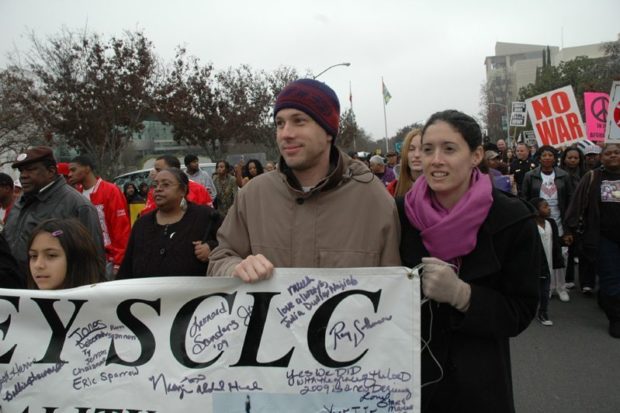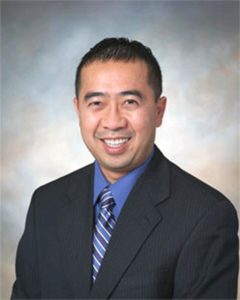
By Richard Stone
This is the first of a series in which I will be asking for interviews with each sitting member of the Fresno City Council. We began this month with Blong Xiong, who unhesitatingly agreed to a meeting.

Blong Xiong, casual and welcoming as I walk into his office, is the first Southeast Asian to be on the Fresno City Council. He represents District 1, stretching up from the Tower into Fresno’s northwest. He has lived in the district for about 15 years. He says it is an area that has ebbed and flowed with the economy, but where specific infrastructure improvements have occurred—he mentions widening the road off Highway 99 near Ashlan Avenue and the building projects at Fresno High as examples.
Xiong says his road to politics was, and remains, community service and advocacy. “You have to be passionate about this work, or it just gets too hard.” Entering politics crossed his mind, but it took the encouragement of colleagues and supporters to convince him he would be a viable candidate. And so he proved to be. But without previous experience, the realities of the job took him by surprise. “My first term, really, was a blur. I had no idea how heavy the politicking is, how many factors go into a decision, how difficult it is to get majority support for a proposal. I’m fortunate to have a second term when I can be much more effective.”
What then about term limits? Are they too restrictive? “I have mixed feelings. It is of obvious benefit to have experience, but the job does wear on you. And sometimes it is only term limits that get out the bad actors.”
As we discuss further the political difficulties of the job, especially in light of the oft-occurring blocs of votes in which Xiong (along with Council Members Oliver Baines and Sal Quintero) are a losing minority, I ask how he felt about the “strong mayor” structure Fresno has. He says he has no problem with the executive leadership given the mayor, but that having the budget also emanate from the Mayor’s office (typically with little prior consultation with the Council) creates an imbalance, with the Council, in effect, scrambling just for relevance. (Editor’s note: The “strong mayor” structure has only been in effect during the tenures of Mayors Jim Patterson, Alan Autry and Ashley Swearingen, all having strong ideological beliefs and personalities already.)
As for other balance-of-power issues, Xiong is again refreshingly candid. Acknowledging there are always trade-offs between the needs of his district and the city as a whole, he says he just does his best to judge matters case by case. But, in the larger picture, he doesn’t see the Council acting effectively to redress the “Tale of Two Cities” that former Mayor Autry so tellingly labeled but then did nothing about. Xiong has also been frustrated by failed efforts to reconcile city/county overlapping responsibilities. “I’ve seen no progress during my whole tenure in office. I wonder why we bother trying when the time and effort seems to bring no results.”
We then proceed through a list of other key issues:
- Privatization: “I’m not against it, but it has to be justified economically and socially. In the case of Measure G [for privatizing the garbage pickup], that wasn’t done.” Xiong says he was happily surprised the public was able to organize to defeat it. “I hope this has shown voters they can make change.” On related issues—neighborhood and downtown revitalization—he sees a crucial factor, often skipped over, is how change will affect the people who use the areas in question. “Gentrifying an area does not solve the problem, it just relocates the poverty.” Concerning downtown, Xiong sees that there have been a series of expensive studies but no follow-through “as if city officials will only support ‘my idea’ and won’t seek a long-term solution that involves the people and programs already in play.”
- When asked about the influence of developers and builders in shaping city policy (e.g., current attempts to redefine “infill” so that it in effect allows development on the city fringes), Xiong agrees they do have strong influence but only as one factor among others including labor, communities and city administrators. He believes the power balance has changed since the days of Operation Rezone, and I wish I shared his optimism.
- Looking at the treatment of the homeless in Fresno, Xiong says a lot of the actions against the encampments are engendered by pressure from businesses and neighbors. Although not condoning the displacement of homeless people with no place to go, he says the major culpability is with the county. “The City has no budget for this work; the County gets the funding for providing social services. Ask them to take responsibility.” True, I say, but this doesn’t explain the large sums spent on dismantling the settlements (not to mention lawsuits for destruction of property) instead of, say, creating safe campgrounds. With little of the “homeless action” occurring in his district, this seemed to me to be one policy that Xiong had not thought through fully.
- He does have a strong opinion about some policing issues, though. Asked about the video surveillance of traffic, he says he initially supported it and at first felt it was doing some good. “But there is no budget to support it now. The promised audit has not taken place; it is not providing service.” Similarly, regarding the police auditor, while giving a vote of confidence to Independent Reviewer Rick Rasmussen, Xiong feels the impact of the office greatly diminished by the narrow scope of investigation allowed. Again, he questions if certain policies are put in place just for show, to say, “We’re doing something,” without serious intent.
On a more positive note, Xiong feels that, despite some “party-line voting” that takes place, the current Council has more mutual respect and collegiality than in the recent past, and members have come to understand each others’ positions better. But for him, an ethnic and political minority on the Council, he has had to learn, “You have to work to make sure your voice gets heard and that your role as community advocate is well-played.” On the other hand, when I ask what he values most about Fresno, he answers immediately, “Its diversity.”
Meeting Xiong face-to-face, I could not help appreciating how complex is the role he plays, even in his self-presentation, which is modest and receptive on one hand and emanates executive authority on the other. I was especially taken by his willingness to join in forthright conversation and only as we were completing the interview to ask about my purposes. I thought, “Here is a man who likes engagement, not seeking to convince or impress.” Still, the impression was good.
*****
Richard Stone is on the boards of the Fresno Center for Nonviolence and the Community Alliance. Contact him at richard2662559@yahoo.com.
